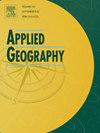Affective relationships as non-material capital assets in building resilience within the rice-terraced cultural landscapes of the Philippine Cordillera
IF 4
2区 地球科学
Q1 GEOGRAPHY
引用次数: 0
Abstract
Natural hazards and socioeconomic risks, including pandemics, necessitate robust resilience-building efforts. While physical infrastructure and financial resources are critical, the importance of intangible assets, particularly affective capacity, is often overlooked. This paper highlights affective capacity as an essential intangible asset for fostering resilience among Indigenous rice farmers in Mayoyao and Hungduan, UNESCO World Heritage Sites in the northern Philippines. The research identifies various hazards impacting the geological and socioeconomic conditions of these farmers, generating cascading risks that require proactive resilience measures. Natural hazards like changing weather patterns and demographic challenges, such as an ageing population and youth outmigration, significantly affect these communities. The study emphasises the role of affective relationships in underpinning both inherent and acquired resilience. Indigenous rice farmers leverage their affective capacities through a well-established network of social capital derived from extended family ties and local community connections. This capacity is strengthened by semi-formal organisations, such as farmer groups and credit unions, which provide essential knowledge and access to financial resources. Additionally, farmers engage their affective capacities through rituals and ceremonies, reflecting the importance of emotional bonds with the spiritual world in resilience-building. State institutions must actively support these relationships to enhance adaptive capacities.
情感关系作为非物质资本资产在菲律宾科迪勒拉的水稻梯田文化景观中建立弹性
自然灾害和社会经济风险,包括大流行病,需要大力开展复原力建设工作。虽然有形基础设施和财政资源至关重要,但无形资产,特别是情感能力的重要性往往被忽视。本文重点介绍了情感能力作为一项重要的无形资产,在菲律宾北部联合国教科文组织世界遗产马约姚和洪端的土著稻农中培养恢复力。该研究确定了影响这些农民的地质和社会经济条件的各种灾害,产生了级联风险,需要采取积极的恢复措施。天气模式变化等自然灾害以及人口老龄化和青年外迁等人口挑战对这些社区产生了重大影响。该研究强调了情感关系在支撑固有和获得性恢复力方面的作用。土著稻农通过广泛的家庭关系和当地社区联系所形成的完善的社会资本网络来利用他们的情感能力。这种能力得到了半正式组织的加强,如农民团体和信用合作社,它们提供了必要的知识和获得金融资源的途径。此外,农民通过仪式和仪式调动他们的情感能力,反映了与精神世界的情感联系在恢复力建设中的重要性。国家机构必须积极支持这些关系,以增强适应能力。
本文章由计算机程序翻译,如有差异,请以英文原文为准。
求助全文
约1分钟内获得全文
求助全文
来源期刊

Applied Geography
GEOGRAPHY-
CiteScore
8.00
自引率
2.00%
发文量
134
期刊介绍:
Applied Geography is a journal devoted to the publication of research which utilizes geographic approaches (human, physical, nature-society and GIScience) to resolve human problems that have a spatial dimension. These problems may be related to the assessment, management and allocation of the world physical and/or human resources. The underlying rationale of the journal is that only through a clear understanding of the relevant societal, physical, and coupled natural-humans systems can we resolve such problems. Papers are invited on any theme involving the application of geographical theory and methodology in the resolution of human problems.
 求助内容:
求助内容: 应助结果提醒方式:
应助结果提醒方式:


